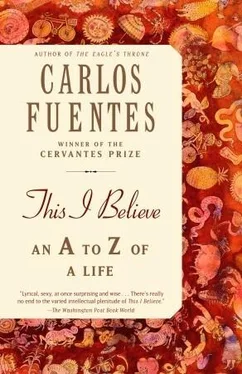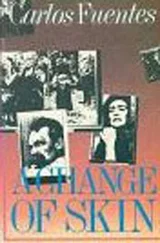Romanticism, however, is more than just a seminal literary school. It also gives rise to a dangerous political theory that champions the recovery of a lost totality as a method for achieving happiness. Karl Marx will call this alienation. But the praxis of the two extremes (that is, right and left) will call it totalitarianism. Adorno warned us of this in advance: “A liberated human race will never be a totality.” The retrograde fantasies of a return to some kind of happy past (the Golden Age myth) serve as the foundation for the elaboration of futuristic fantasies about “the happy identity of subject and object.”
The great tragedy of the modern age has been the loss of tragedy as it existed in antiquity. What I mean is that the alienation brought on by inevitable, ascendant progress as a condition of happiness has led us to the perplexing paralysis of Panurge’s sheep when history proved to us how very easily happiness could be sacrificed on behalf of totalitarian political systems that promised total happiness, though only in exchange for total submission.
I see two paths — equally difficult, perhaps impassable — that we may embark upon to arrive at a new concept of happiness for our times. The more arduous one calls for a restoration of the tragic spirit. The tragic perception harbors no illusions regarding the evil that men are capable of inflicting upon one another. The tragic hero transgresses. But, as Anaximander reminds us, he purges his excesses in accordance with “the laws of time.” Tragedy is the “law of time” that the Mediterranean thinker identified to redeem the fallen hero and reestablish the order of the city through catharsis, the manifestation of which resolves the conflict between freedom and inevitability, and thus grants us, through an understanding of ourselves and of those around us, the measure of happiness that is our due.
The more accessible path is one that affirms identity without undermining diversity, that ensures the preservation of identity while still defending the respect that diversity deserves. It is all too easy to point out, ad nauseam, the various modern-day obstacles strewn across the path of this equilibrium between diversity and identity: political obstacles, social obstacles, personal obstacles, informational and educational obstacles, et cetera. Yet can we conceive of a reality that does not encompass both the personal gratifications that associate “happiness” with creativity, eroticism, filial love, bed and board, home and hearth, those little things that are as much our true “nation,” as José Emilio Pacheco describes in his great poem “Alta Traición” (High Treason), as are the social or collective gratifications of good government, administrative integrity, public security, the right to dissent, and the faculty to elect?
Yet we must not fool ourselves either. In the personal sphere alone, can we conceive of a happiness that is unsullied, sooner or later, by the death of a beloved, a fissure in a romantic relationship, a fidelity betrayed, a friendship broken?
Precisely for this reason, happiness is an ambiguous, critical, and at times disguised word whose true nature can only be revealed by the light of love.
Latin American, Euro-Latin, and, I suppose, Franco-African and Franco-Asian children learned their Universal History out of the little green books by Messrs. Malet and Isaac that neatly compartmentalized history into the Middle Ages, the Modern Age, and the Contemporary Age. The first segment began with the consolidation of Christianity after the fall of Rome. The second age was up for grabs — it began either with the discovery of the Americas or the fall of Constantinople, and the third began, of course, with the French Revolution in 1789.
It was a history of the Western world, for the Western world. Nevertheless, far more significant times and spaces were hidden behind the catalogue of dates and events. The life force of the hierarchical medieval system, organized vertically and grounded in faith, was rooted in the political tensions between the spiritual and temporal powers of the day. After a time, this tension— which was absent in the Russian and Byzantine realms — would give way to democracy. The Renaissance put an end to feudal fractionalism and saw the birth of the nation-state, fueled by a mercantile tradition and ravaged by many religious wars. Non-European peoples were granted admission into this Universal History, but only as the result of foreign conquest, and only insofar as they allowed themselves to be colonized — that is, “civilized,” or in other words (and without quotes), exploited. This was the age of divine right and absolute monarchy, which would eventually be undermined by the emergence of the industrial and mercantile bourgeoisie whose cries of emancipation led the French and American revolutions. The Contemporary Age, finally, was presented as a nineteenth century of material development that, at the beginning of the twentieth century, promised to be synonymous with progress, freedom, and happiness: the dream of modernity, the triumph of Condorcet’s optimism.
In this sense, the millenarian framework possessed a space: the entire world, colonized by the West, but only one time, specifically that of Western history as a measure of all that was exclusively human: Hume, Herder, Locke. And can there be any doubt that a Western millennium written by Dante, Cervantes, and Shakespeare, sung by Bach, Mozart, and Beethoven, built by Brunelleschi, Fisher von Erlach, and Christopher Wren, painted by Rembrandt, Velázquez, and Goya, contemplated by Thomas Aquinas, Spinoza, and Pascal, sculpted by Bernini, Michelangelo, and Rodin, novelized by Dickens, Balzac, and Tolstoy, versified by Goethe, Leopardi, and Baudelaire, filmed by Eisenstein, Griffith, and Buñuel, and explained by Kepler, Galileo, and Newton is one that has granted glory not only to the West but to all of humankind?
“How is it possible to be Persian?” Montesquieu asked himself ironically during an Enlightenment that nonetheless (and despite Vico) left the nonwhite, non-European majority of humankind shrouded in shadows? The conquest or reconquest of the historical presence of the marginalized peoples of Asia, Africa, and Latin America is one of the essential realities of this millennium. As it turns out, there wasn’t just one history. There were many histories. There wasn’t just one culture. There were many cultures.
To arrive at the end of the millennium with this understanding is one of the triumphs of that millennium.
On the other hand, the age that comes to a close will also bear the mark of Cain, the violence of man versus man. Hobbes’s homo homini lupus sullied the great scientific and artistic conquests of the millennium. Intolerance manifested itself from the Catholic and Protestant tribunals and continued on through the tribunals of Vishinsky and McCarthy. Amidst all this, increasingly painful pages of a universal history of violence were written during the conquest of America, the Thirty Years War, the persecution and expulsion of Europe’s Arab and Jewish minorities, the European colonial assault on black Africa, India, and China. But they were also written during times of economic expansion thanks to forced labor, child labor, racially motivated slavery, and the marginalization of the female gender.
Man’s capacity to inflict pain on his brethren culminated in our own moribund twentieth century. Never before in all of history have so many human beings died in so cruel a manner. Add up the millions of dead in the two world wars, plus the subsequent colonial wars — Algeria, Vietnam, the Congo, Rhodesia, Central America — to those who were victims of internal terror regimes, such as Adolf Hitler’s order to exterminate Jews, Catholics, Communists, Gypsies, slaves, and homosexuals; those who perished in Joseph Stalin’s prisons as he systematically exterminated first his own comrades and later millions of citizens; and then, on a more modest though no less painful scale, the victims of the military dictatorships of Latin America, fostered and coddled by the United States under various administrations.
Читать дальше












